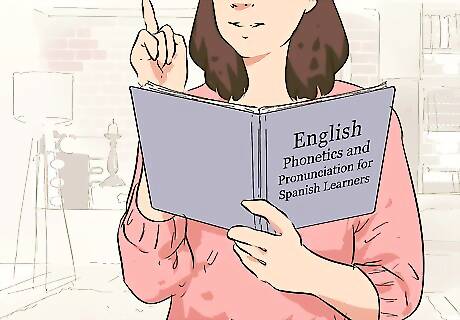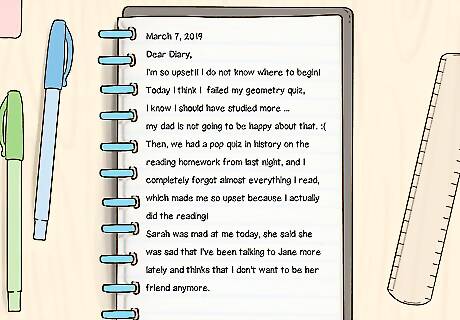
views
Improving Your Spoken English

Go to an English class. Another great way to put some more English conversation into your week is to go to an English class. Going to an English class is a great way to focus on some of the more formal parts of speaking English. A class will teach you the grammatically correct way of speaking -- which has proper sentence structure and verb conjugation and will provide a very organized way to learn English.

Study English Phonology. Phonology deals with English pronunciation. In English we don't say what we write. Every word has a phonetic form. Some dictionaries have the phonetic form of a word and the word. You can search online for Phonology videos. Find online dictionaries for pronunciation. In Informal English the letter "g" at the end of suffix "ing" is not pronounced. So you will hear the word "talking" as "talkin". When "th" is preceded by the consonant, the letter "n" is pronounced from the "th" tongue position. The phrase "in the"will be heard as "inna". When 't' is between two vowels "t" is pronounced as flap "t" which is heard as "d". The word "letter" is heard as "ledder".

Speak English every day. The absolute best way to learn any language is to use it. It doesn't matter if you only know five English words or if you're almost fluent -- speaking English with another person is the best way to improve. Don't wait until you "feel more comfortable" speaking English -- you won't get there for a long time, so start speaking English today. You'll be amazed at how quickly your English improves. Find a native English speaker to talk with. If you live in an English-speaking country, you can practice by starting simple conversations with the people you meet, whether it's saying "hello" or asking someone for directions.

Improve your pronunciation. Even if you are good at English, with good grammar and a large vocabulary, native English speakers may have trouble understanding you if your pronunciation is not correct. Correct pronunciation is needed if you want to improve your English. Listen carefully to how native English speakers pronounce words and sounds and do your best to copy them. Pay attention to any sounds that you don't know. For example, some people have trouble pronouncing the "r" sound, as it does not exist in their native language, while other people have difficulty with some consonant combinations, such as the "th" sound. Be aware that the pronunciation of English words varies a lot depending on where it's spoken. For example, American English is very different from British English. If you want to travel to or live in an English-speaking country, this is something you should consider when learning how to pronounce words.

Expand your vocabulary and use idioms. The larger your vocabulary and the more English phrases you learn, the easier speaking English will become. Again, spending time with native English speakers will help you learn common vocabulary and phrases naturally. Although reading, watching English TV and listening to the news is also helpful. Once you learn a new word or phrase, you should use it in a sentence -- this is the best way to memorize it. Another way to memorize words is to make labels for everyday household items and attach them to those everyday items. Then every time you use the kettle or look in the mirror, you will see the English word for these items. You should also start a notebook of idioms that English speakers use all the time. Some examples include "it's raining cats and dogs" (raining heavily), to be on "cloud nine" (to be very happy) or saying something is a "piece of cake" (when something is very easy). Using these idioms in your conversation will help you improve your English.

Have a dictionary. Having an English dictionary (whether it's an actual dictionary or a digital one) can be very useful. Having a dictionary means that you will be able to understand conversations in English and have conversations in English. Having an English dictionary will help you memorize English words. If you don't want to buy a dictionary٫ you can use an online dictionary or install a dictionary app on your phone or tablet.
Improving Your Writing, Reading and Listening Skills

Listen to radio or podcasts in English. One of the best ways to improve your English is to download podcasts or radio apps in English on your phone or MP3 player. You should then try to listen to podcasts or radio shows for at least 30 minutes per day. Do it in the gym, on your way to work, or while you're sitting at your computer. Try to understand what's being said, don't just listen to it. Even if it is too fast, try to listen for keywords and phrases to get an idea of what the conversation is about. If you can, make a note of any words or phrases that you don't understand and look up the translation afterwards. Then listen to the podcast or show again to hear the new words or phrases in context.

Watch movies and TV shows in English. Another fun way to improve your English is to watch movies and TV shows in English. Try to pick movies or TV shows that you will enjoy -- this will make it more fun, which will help you actually learn English. However, you should avoid watching movies or television shows with subtitles in your native language -- they will only distract you and you will be less likely to learn English from it.

Read a book, newspaper or magazine in English. Reading is a great way to improve your English. Find something you like -- whether that's a famous English novel, The New York Times or a fashion magazine and read it. If it is boring, you won’t learn from it. Again, try to actually understand what you're reading, don't just read it. Highlight any words or phrases that you don't know, then look them up in the dictionary. If you're all alone, you could also try reading out loud.

Keep a diary in English. Aside from reading and listening in English, you should also spend some time improving your written English skills. This may be one of the most hard parts of learning English, but it is still important. Writing in English will help you to work on your sentence structure, grammar and spelling. Try keeping an English diary where you write down a few sentences every day. It doesn't have to be personal -- you could write about the weather, what you ate for dinner or what your plans are for the day. If you feel comfortable with it, get a native speaker to read what you've written and check it for any mistakes. This will help you to avoid making the same mistakes over and over again.

Find a native English speaker and make them your pen-pal. Once your written English has improved, you could consider getting an English-speaking pen-pal! Your pen pal could be someone who is learning English like you, or they may be a native English speaker who wants to practice their foreign language skills by writing to you in your native language. Having a pen pal from an English-speaking country (such as the United States, Britain, Canada, Ireland, Australia, New Zealand or South Africa, for example) will also let you learn more about the culture and what life is like there.
Committing to Your New Language

Stay motivated. When learning any new language, it is important to stay motivated and never give up. Remind yourself of all the good things about being fluent in English. You will be able to talk with English speakers from around the world and make new and exciting relationships, you will be able to engage with English-speaking culture like never before and maybe improve your job when you are fluent in English.

Practice every day. If you want to be fluent quickly, you need to practice every day. Learning a new language is based on repetition, so if you wait too long between study, you will forget everything you learned and have to start all over again, wasting time. However, you shouldn't study so much that you get bored of English -- try to keep things fun by doing a different thing each day - one day of reading, one day of listening, one day of writing practice, one day of studying grammar, etc. However, you should never skip an opportunity to practice speaking English, as this is the most important thing you should do to be fluent.

Think in English. One way to go from being very good at English to being fluent is to actually think in English. Don’t translate from English into your native language and from your native language into English As a result, your English will sound more natural to native speakers and you will speak more fluently.

Make friends with English speakers. This way, you will have to speak English if you want to talk to your friends.

Don't be afraid to make mistakes. Mistakes actually help you improve. Everyone makes mistakes, it’s normal. When learning English, you aren’t trying to be perfect. Even native English speakers don’t have perfect English.




















Comments
0 comment